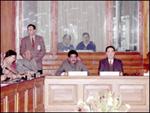 |
Chinese, Indian Parliaments Should Enhance Exchange and Cooperation: Li Peng

China to Set up Sino-Indian Parliamentary Friendship Group Soon: Li Peng
Chinese top legislator Li Peng raised a three-point proposal for strengthening parliamentary contacts and cooperation between China and India in New Delhi on Thursday, January 11.
The proposal includes increase of personnel exchanges between the two parliaments, the establishment of a Sino-Indian Parliamentary Friendship Group and closer cooperation between the two parliaments in international affairs.
Li, chairman of the Standing Committee of the National People's Congress (NPC), who is here on a week-long official goodwill visit, raised the proposal during his talks with G.M.C. Balayogi, Speaker of Lok Sabha, or the lower house of the Indian parliament.
Balayogi responded that he completely agreed to Li's proposal, and that the Indian side had already established an Indian-Chinese Parliamentary Friendship Group. The two sides also reached consensus on broader exchange and cooperation between the two parliaments.
During their talks, Li and Balayogi had a happy recall of their last meeting during the millennium summit of parliamentary leaders last year, saying they were very happy to meet here again.
Warmly welcoming Li's visit, Balayogi said that he believes Li, who is holding the key position as the NPC Standing Committee chairman, will surely contribute to the exchange between the two parliaments. He also suggested that Li, who is visiting India for the second time following his last in 1991, go to several major states of this country to learn more about India's culture and economic development.
Briefing Li on the operation of the Indian parliament, Balayogi noted that all parliamentary members of the Lok Sabha wish to enhance contacts and cooperation with the Chinese NPC.
Balayogi noted that Indian President K R Narayanan stressed during his visit to China last May that India and China didn't constitute any threat to each other and therefore should work to become friendly cooperative partners.
India attaches great importance to developing long-term friendly and cooperative relations with China, said Balayogi, adding that he hopes the current development momentum of bilateral ties be maintained through exchange of visits by leaders of both countries.
Li told his Indian host that he has come with the aim of enhancing understanding and cooperation, and expressed the hope that his visit would help further strengthen Sino-Indian relations.
Li recalled that during late Indian Prime Minister Rajiv Gandhi's visit to China in 1988 the two countries reached an agreement on bilateral ties. The state visit to India by Chinese President Jiang Zemin in 1996 and President Narayanan's visit to China last May also powerfully propelled the development of Sino-Indian relations.
Li pointed to the fact that as close neighbors and the two most populous developing nations in the world, China and India have similar national conditions, face same challenges of development and both need a peaceful and stable international environment.
China and India also share identical or similar views on many international issues, as both countries advocate multipolarization of the world and hope to enhance cooperation to meet the challenges of economic globalization, he added.
"A lasting and stable good-neighborly cooperative relationship between China and India is not only the two peoples' common aspiration and in their fundamental interest, but also conducive to peace and stability in Asia and the rest of the world," Li asserted.
The Chinese people cherish their traditional friendship with the Indian people and earnestly want to develop a good-neighborly relationship with India on the basis of the Five Principles of Peaceful Co-existence, he noted.
Calling the new century "a high-tech era", Li said both China and India attach much importance to the development of high technologies, and there are broad prospects for bilateral exchange in this field.
He also noted that India, with its advantages in some areas like software development, has something for China to learn from.
Explaining China's people's congress system and the operation of the NPC to Balayogi, Li said that although the two countries differ in their parliamentary systems and forms of democracy, this should never affect the exchange and cooperation between the two parliaments.
Li also expressed his belief that some problems between China and India should by no means affect the development of bilateral relations.
"As long as both sides can take each country's long-term interest into account, we can resolve various problems through friendly consultations," Li said, adding that he agrees to Balayogi's view that China and India are no threat to each other.
Li also invited Balayogi to visit China, which the latter happily accepted.
Following the talks, Li watched a special entertainment show presented by Indian artists and also attended a welcoming banquet hosted by Balayogi.
Also present at the banquet were Li's wife Zhu Lin and Vice-Chairman of the NPC Standing Committee Buhe.

In This Section

|